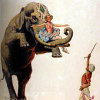In this week’s NYTBR, Naomi Wolf doesn’t like what she’s seeing in certain kinds of YA:
Yet if that parent opened one, he or she might be in for a surprise. The "Gossip Girl," "A-List" and "Clique" series — the most successful in a crowded field of Au Pairs, It Girls and other copycat series — represent a new kind of young adult fiction, and feature a different kind of heroine. In these novels, which have dominated the field of popular girls’ fiction in recent years, Carol Gilligan’s question about whether girls can have "a different voice" has been answered — in a scary way.
I haven’t actually had time to read her piece yet; I’ll update this post when I do (assuming it provokes some sort of response). I’m hoping it’s more than the standard "oh, these teenagers, they grow up so quickly and just look at what they’re reading!" piece. In the meantime, opinions? Anyone else looked at it? Off to do taxes.
Updated:
Okay, so I finally got a chance to read it. (Hell weekend.) And mostly, I echo what y’all are saying below. Much ado about what? The literature of the shallow? It seems to me the vast majority of girls reading these books are reading them as pure escapist or pleasure literature; just because you want to look at what’s on Paris Hilton’s Trio every once in awhile doesn’t mean you want to be Paris Hilton. Or that your life or value system is similar to hers in any way.
Having read very little of this stuff myself (I’m with Scott, the brand-dropping just GRATES), it seems to me that Wolf is making an argument I have seen played out in real life in pretty tame ways. In my experience, it usually involves magazines.
My parents, for instance, never told me what to read or not read. They were glad I did it and helped me have greater access to books however they could. The only time, in fact, that my mother ever expressed concern over something I was reading involved an issue of Sassy magazine (purchased from the local Convenience store), which contained a detailed diagram of the male form with information about various things (some sexual). Years and years later, I was in a household with similar permissiveness in reading material where a teenage girl was forbidden from reading (my) Jane magazine because of sexy content. Now. I don’t believe the parents in either case thought that saying "You can’t read that" would stop us from finding out this stuff (or even keep us from reading it), but it was their impulse, so they did it anyway. I think Benjamin Rosenbaum’s right on the money that it’s not an unusual or even wholly bad thing for parents to react with concern about things like this sometimes. (When they go over the top with it, that’s something else.) They wouldn’t be parents if they didn’t. Naomi’s reacting like a mom and her reaction is lame — it’s also a little sweet if you look at it sideways (but still lame).
It seems to me that these novels — the It Girls and Slut Queens or whatever — are Cosmopolitan and Jane packaged as narratives. That’s why they’re so full of brand names. That’s why they’re so full of shallowness. And that’s okay. Just like flipping through a magazine and reading sex tips for adults didn’t transform my teenage mind, burning out all feminist ideals and turning me into a docile Prada wearer or a high-priced call girl, so I don’t believe that’s a real danger to the girls reading these books.
It’s just for fun. Leave it alone.
See also:
Scott Westerfeld’s response (and yay! on the listyness)
Colleen Mondor’s response
p.s. I’m bumping this post up since there’s some interesting discussion going on in the comments.



